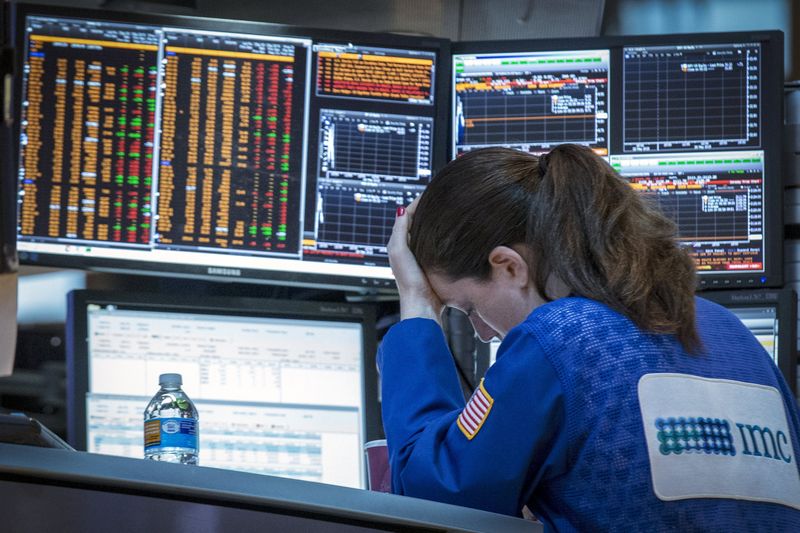By Geoffrey Smith
Investing.com -- Markets fall back into risk-off mode as the signs of a global recession multiply. The dollar continues to climb as financial markets worldwide show increasing signs of stress. Tesla (NASDAQ:TSLA) will be in focus after Bay Area authorities squashed its efforts to keep its Fremont factory open during the lockdown, while BMW joined Volkswagen (DE:VOWG_p) and Fiat Chrysler in suspending production in Europe. Angela Merkel raised hopes of a jointly guaranteed eurozone safe asset, but sovereign spreads continue to widen ominously. Here's what you need to know in financial markets on Wednesday, March 18th.
1. Markets resume sell-off
Global stock markets resumed their descent, afraid that government measures to support the economy still won’t be enough to avoid a sharp recession.
By 6:45 AM ET (1045 GMT), U.S. stock futures had given up most of the gains made by underlying cash indices on Tuesday. Dow Jones 30 Futures were down 833 points or 4.0%, while the S&P 500 Futures contract was down 3.7% and the Nasdaq 100 futures contract down 4.5%.
In Europe, the benchmark Stoxx 600 was down 4.6%, while in Asia overnight, the Nikkei and Chinese CSI 300 had both fallen 1.7%, while Australia’s ASX fell 6.4%.
Signs of dysfunction in financial markets continue unabated, as the European Central Bank allotted $75.8 billion through an 84-day swap operation with eurozone banks – more than it ever did during the 2008/9 crisis. It also lent another $36 billion through a one-week facility.
The benchmark 10-year Treasury yield rose 15 basis points to 1.14%, while gold futures fell 1.1% to $1,509.02 an ounce.
2. The dollar is the ultimate risk-aversion measure
The biggest single indicator of risk aversion, and of stress in global financial markets, remains the price of the dollar (hence the massive demand for dollars at the ECB’s swap operation).
The index that measures the dollar against developed-market peers has risen over 4% against developed-market currencies in the last nine days, and hit a fresh two-year high overnight, thanks to sharp gains against commodity currencies such as the loonie, Aussie and kiwi.
It’s making even sharper gains against emerging currencies, hitting a fresh all-time high against the Brazilian real on Tuesday, and rising 3% against the ruble to a new four-year high in early European trading on Wednesday. The dollar’s also up 4% against the Mexican peso overnight, and up over 1% against the Turkish lira at a two-year high.
3. France gets its bazooka ready after Merkel flags talks on euro-bonds
France is due to announce an emergency budget in what is likely to be the latest in a series of fiscal bazookas to be fired at the Covid-19 pandemic.
Late on Tuesday, German Chancellor Angela Merkel raised the hope that the crisis could lead to the euro zone issuing jointly-guaranteed bonds to finance the region’s response packages. That would be a major leap forward from the response to the sovereign debt crisis that began a decade ago.
However, eurozone sovereign spreads continued to widen on Wednesday, mindful that any such move would need the approval of parliaments that have become more sceptical, rather than less, toward such measures over the last few years. German 10-year bond yields rose to a two-month high of -0.27% on a combination of Merkel's comments and forced selling by portfolio investors to raise liquidity.
4. Biden nearly home and hosed
Former Vice President Joe Biden all-but wrapped up the Democratic Party’s presidential nomination with a clean sweep of primary victories in Florida, Arizona and Illinois.
The victories amped up the pressure on Vermont Sen. Bernie Sanders to drop out of the race. After the latest round of primaries, Biden has 1,147 delegates compared to Sanders 861. To be sure of victory, candidates need the support of 1,991 delegates at the national convention.
5. Tesla will have to shut its Fremont factory
Among many stocks likely to be pressured at the opening is Tesla.
Alameda County officials confirmed on Tuesday that the carmaker’s Fremont factory is not classified as an essential business and is therefore subject to the lockdown order issued by Bay Area authorities over the weekend.
The measures will bring Tesla’s most important production facility effectively to a halt. However, it’s far from alone in having that problem – German automaker BMW joined Volkswagen and Fiat Chrysler in suspending production at its European factories earlier Wednesday.
